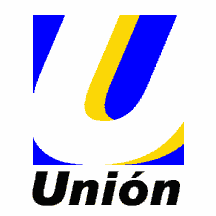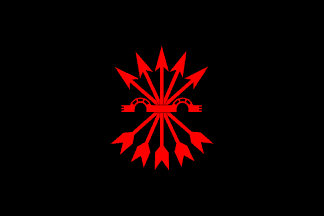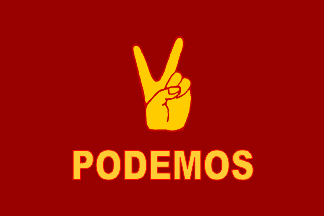 klaus-michael schneider
klaus-michael schneider
Keywords: venezuela |
Links: FOTW homepage | search | disclaimer and copyright | write us | mirrors

Last modified: 2021-08-26 by  klaus-michael schneider
klaus-michael schneider
Keywords: venezuela |
Links: FOTW homepage |
search |
disclaimer and copyright |
write us |
mirrors
See also:

image by Guillermo Aveledo, 2 September 2004

image by Guillermo Aveledo, 2 September 2004

image by Francisco Manuel Garcia, 2 September 2004
The PCV was founded in 1931, though it has its origin in 1929,
in the Partido Revolucionario Venezolano. Its clandestine
condition, and its tactics of dispersion and inflitration inside
other organisations make difficult to folow a "lineal"
path for its history, as it sometimes was forced to assume
different names, like Partido Revolucionario del Pueblo, Unión
Popular Venezolana, etc. Legalised for the first time in 1945, it
assumes the name PCV. Although the party was outlawed againt on
the late forties, it enjoyed a brief surge between 1958 and 1960,
when it was once again dissolved, as it supported the guerrilla
warfare movement in Venezuela, which emerged after the Cuban
Revolution. The PCV is the bastion of marxist-leninist orthodoxy
in Venezuela. Despite its historical importance as one of the
first modern Venezuelan political parties, the PCV has never had
a significant parliamentary presence beyond the 1958 Congress. It
has nurtured, moreover, through its splits and divides, due to
their own dynamics and to the divisions of socialism worldwide
after the 1960s, a myriad of smaller parties. Its largest split
came in 1972, when a large number of comrades formes the Movement
Toward Socialism (MAS) rebelling against the PCV's support of
Soviet repression in Easter Europe; the MAS was to become one of the
most succesful left-wing parties in Venezuela. Nowadays, the
Venezuelan Communist Party has no representation in Congress, and
is scarcely present in public office. However, its prestige gives
it a prominent place in the coalition of parties supporting the
government of Hugo Chavez. The main symbol od the
Venezuelan Communist Party (PCV) has been a red rooster. Although
they also use the Comunist Hammer and Sickle, and even though the
Venezuelan Communist Youth used a star with its acronym (JCV)
during the 1950s, as can be seen through period photographs and
documents, and as it is noted by Venezuelan historian Manuel
Vicente Magallanes, the red rooster has been their main symbol
for at least four decades. The red rooster flag has a few
variations, as shown above. Normally, the red rooster is placed
within a yellow circle. Sometimes, though this is rarely sighted,
they trace the rooster's contour in black. Normally, the
Communist party's flag is almost square, and almost always a red
field.
The origin of the rooster as the main symbol of the PCV has, as
we've been able to find, two different versions. The first one
says that Venezuelan Communist exiled in France during the late
forties took te Coq Gaoulois, used in a limited manner by the
French resistance and by the Parti Communiste Francais. The other
one goes as saying that the rooster was the symbol of the paper
Tribuna Popular, the information organ of the PCV, ultimately
becoming the symbol of the whole party. It must be said that
those old communists which have been contacted are ambivalent
about both stories. In any case, early documents of the PCV do
not show the rooster.
Guillermo Aveledo, 2 September 2004

image by Guillermo Aveledo, 2 September 2004

image by Guillermo Aveledo, 2 September 2004

image by Guillermo Aveledo, 2 September 2004
The Comunist Youth of Venezuela, the youth wing of the party,
is the refuge of the more traditional communist symbols. The flag
shown as above has an effigy of the Che Guevara, the famous Latin
american Guerrilla Leader, sith the caption "Juventud
Comunista". This flag has been mostly replaced by more
traditional hammer-and-sickle flags. The bottom flag bearing the
JCV emblem (which resembles a hammer-and-sickle red flag).
Guillermo Aveledo, 2 September 2004
At <chasemeladies.blogspot.com>
there is a large hammer-and-sickle
flag marked JCV. That appears to be a Venezuelan communist.
jadjad, 17 August 2005
The flagis with <www.jotaceve.org>,
which is the predictable "Juventud Comunista de
Venezuela" (which
means Venezuelan Communist Youth).
Antonio Martins, 17 August 2005

image by Raul Orta, 6 June 2007
Possible flag of the so called Partido Socialista Unido de
Venezuela - PSUV ( United Socialist Party of Venezuela) that
by initiative of Hugo Chávez has been activated to unite into a
same front all the political and social movements that
endorses him.
The image is a reconstruction of banderoles - Japanese damyo
style - that have come carrying the propulsive and followers of
the mentioned party. Its shows on a red field a white
delineated image of a five-pointed star and vertically
the initials of the party. On the base completes the
vexiollography a white box with the legend 'Con Chavez un sólo
gobierno' (something like 'With Chavez only one goverment') in
red gothic capital letters: one among many slogans of his
regime.
Raul Orta, 6 June 2007

UNION for the Progress
image by Guillermo Aveledo, 12 September 2002

Democratic Left
image by Guillermo Aveledo, 12 September 2002

MAS (Movement to the Socialism)
image by Guillermo Aveledo, 12 September 2002
The "UNION for the Progress" Political Party was
formed around the groups that on year 2000 supported Lieutenant
Colonel (retired) Francisco Arias Cárdenas in his candidacy for
the Presidency of the Republic. Its principal nucleus is a party
created at the end of 1999 with the old guard of the MAS
(Movement to the Socialism) Party, called "Democratic
Left" (Izquierda Democrática). The MAS, founded on 1973,
fundamentally was originated by a rupture of the PCV (Communist
Party of Venezuela), after which then Communist Youth was
rebelled as opposed to the "stalinism" of the old
guard, criticizing the repression to the "Prague's
Spring" on 1968. The Communist Youth of Venezuela and other
leaders of the PCV were sanctioned by the Polit-bureau of
the Soviet Union Communist Party. But that one is another
history (although very near one to three of the four greaters
leaders of UNION). UNION also agglutinates some retired
militaries (some, like Arias, involved in the 1992' putsches),
old political and union leaders of left "not aligned"
and others.
Its emblem is one capital "U" in white, blue and
yellow, without greater meaning than the initial of the word
"Union". Its "flag" is its logo on target, in
proportion 1:1. It doesn't have reverse.
The Website of the Union is <www.unionve.com>.
Guillermo Aveledo (translated by Raul Orta), 12
September 2002

image by Ivan Sache, 29 January 2013
Partido Bandera Roja (Red Flag Party), commonly known as Bandera Roja, was
founded on 20 June 1970 as a splinter of Movimiento de Izquierda Revolucionaria
(MIR - Revolutionary Left Movement). Originally involved in guerilla actions,
Bandera Roja quit armed struggle and became a political party, with
marxism-leninism as its main ideology. The first congress of the party was held
in clandestinity in 1990, while the party was officially registered in 1994.
Bandera Roja joined Coordinadora Democr·tica (Democratic Coordination) with the
goal of ousting President Hugo Ch·vez from the power, claiming he is a "false
Communist". In the last general elections, held in September 2010, Bandera Roja
obtained slightly more than 60,000 votes (0.6 %). -
Party website
The flag of Bandera Roja is red with the white letters "BR" in the middle.
Photos of the flag
-
Photo of a street demonstration, "El Nacional", 20 January 2013
- "Ultimas
Noticia", 10 November 2011
http://espressostalinist.wordpress.com/2011/03/11/bandera-roja-venezuela/
Ivan Sache, 29 January 2013

image by Zoltan Horvath, 22 February 2014

Variant
image by Zoltan Horvath, 22 February 2014
"Primero Justicia (Justice First in english) was created in 1992 as a Civil
Association by a group of university students (under the leadership of Alirio
Abreu Burelli) who were concerned about what they saw as a deterioration of
judicial power in the country and joined their efforts to contribute to the
reform of Venezuela's legal system. Primero Justicia became a political party in
2000,[6]initially as a regional party, and was registered as a national party
with the National Electoral Council of Venezuela on 1 March 2002"
Source:
http://en.wikipedia.org/wiki/Justice_First
It is a party of the oppossition of the current regime.
Its flag is the
logo on a yellow horizontal flag, bearing the word "PRIMERO" in black
capital letters and below the word "JUSTICIA" in yellow capital letters
(sometimes a gathering of several flags during protests are called "la marea
amarilla", the yellow wave).
The flag is seen here:
http://4.bp.blogspot.com/_ouQSOLTgSpE/R4ZsCYqCSuI/AAAAAAAAAeI/4ouEJJpzxbk/s1600-h/100_0036.JPG
For additional information go to:
Primero Justicia (official website)
Esteban Rivera, 22 February 2014
I found another version of this party flag, it is simple yellow with black
letters.
Please see:
http://www.barinas2012.net/wp-content/uploads/2013/03/JOVENES-PRIMERO-JUSTICIA-BARINAS.jpg
Zoltan Horvath, 22 February 2014

Current flag
image by Tomislav Todorović, 08 July 2013

Previous flag
image by Tomislav Todorović, 08 July 2013
Venezuelan Phalanx /(Falange Venezolana)/ is a minor political movement which
is modelled after the Spanish Phalanx. Its current flag differs from that of the
model movement in an all-black field, which they claim that is a common feature
of all Latin American Phalangist movements; the red color of yoke and arrows was
kept unchanged [1]. The earliest appearance of this design on the Web was in
February 2002 [2], so it was probably introduced not long before that. The
previous flag had employed only the colors of the Spanish Phalangist flag,
having been charged with a large red arrow cross on black field. The image of
this pattern did appear side by side with that of the national flag (pre-Chavez
variant) on the old website [3], but it is not distinguishable from the black
page background, so its use as a flag is to be confirmed indirectly, by its use
at the site of The Phalanx /(La Falange)/, a minor Phalangist party ffrom Spain,
where it appeared along with the flags of other Latin American Phalangist
movements [4]. Along with its own flag, the Venezuelan Phalanx also uses the
Cross of Burgundy flag as the symbol of Hispanity /(Hispanidad)/ [1].
Sources:
[1] Venezuelan Phalanx website -
symbols
[2] Venezuelan Phalanx website at the Internet Archive -
earliest record of the symbols' page
[3] Venezuelan Phalanx
old website at the Internet Archive (Image)
[4]
The Phalanx website at the Internet Archive - links to the Latin American
Phalangist movements' websites (Image)
Tomislav Todorović, 08 July 2013

image by Zoltan Horvath, 24 February 2014
During this news report back in December 18, 2012 when this article appeared,
mentioning the consolidation of "Voluntad Popular" (a political party), one can
see a maroon flag with a dark yellow fist and below the word "DEMOCRACIA",
behind the two main figures in this picture (from left to right: in maroon shirt
Henrique Capriles Radonski (who would become the moppossition leader during the
2012 Venezuelan Presidential elections and again the main oppossition candidate
during the 2013 Venezuelan Special Presidential elections after the death of
President Hugo Chávez); and in blue shirt Leopoldo López Mendoza, who would
become the main opposition figure during the current 2014 Venezuelan protests
against the current regime, incarcerated on February 18, 2014.
The flag is seen
here.
Source:
http://www.leanoticias.com/2012/12/18/voluntad-popular-se-consolida-como-la-cuarta-fuerza-politica-dentro-de-la-unidad-democratica/
Esteban Rivera, 22 February 2014
It seems that field of this flag is dark red instead of maroon (at least on
my screen), and fist and text has a lighter red border.
Zoltan Horvath, 23 February 2014
This party is called PODEMOS.
I have recorded some notes on it:
"Por la Democracia Social (Podemos, acrónimo de Por la Democracia Social) es un
partido político venezolano con tendencia socialdemócrata,
fundado en 2002 y legalizado el 23 de abril de
2003, surgido de la escisión por la
izquierda del
Movimiento al Socialismo (MAS). Bajo sentencia del TSJ los derechos sobre el
partido Podemos fueron cedidos al ex-gobernador del estado Aragua
Didalco Bolívar.
For the social democracy (PODEMOS = We can) is a Venezuelan political
party claimed to be social democratic, created in 2002 and registered 23 April 2003, split from MAS (claimed to be left but allied to the right)
Theres at less three versions: logo at hoist and name at side (below the
name, in white - por la democracia social); logo above and name below;
and name above, below other inscription (I cant read it), below a third
inscription (also I cant read it) and at hoist of the three inscriptions a
vertical blue rectangle with a white sign or letters (perhaps VOTE but is
unclear)
Jaume Ollé, 24 February 2014

image by Zoltan Horvath, 22 February 2014
"Voluntad Popular is announced on December 5, 2009, when Leopoldo López along
other politians from Un Nuevo Tiempo, Primero Justicia and
Acción Democrática made the official presentation of the
Popular Will Movement (Movimiento Voluntad Popular). The movement was then
established on this date, and registered as a political party on January 14,
2011. It has its origins on the creation of Popular Networks (Redes Populares)
on the year 2004 as a way to promote social action and leadership on the
communities. It was first called Voluntad Popular Activistas (VPA), later
dropping the word "Activistas".
Sources:
http://es.wikipedia.org/wiki/Voluntad_Popular
The flag is an orange horizontal flag with the
logo in the
middle, as seen
here.
Source:
http://www.leanoticias.com/2012/12/18/voluntad-popular-se-consolida-como-la-cuarta-fuerza-politica-dentro-de-la-unidad-democratica/
For additional information go to:
Voluntad Popular (official website)
Esteban Rivera, 22 February 2014

image by Zoltan Horvath, 22 February 2014
"Un nuevo tiempo (A new era) is a political party established in 1999 as
regional and then in 2006 consolidated as a national center-left political
party."
Source:
http://en.wikipedia.org/wiki/A_New_Era
It is part of the opposition to the current regime.
The flag is the logo (
http://en.wikipedia.org/wiki/File:UnNuevoTiempo.png ) on a blue
horizontal flag, as seen
here
and here.
Sources:
http://yoyopress.com/author/andres/page/298/ and
http://www.jds-unt.org/?p=600
For additional information go to:
Un nuevo tiempo (official website)
Esteban Rivera, 22 February 2014